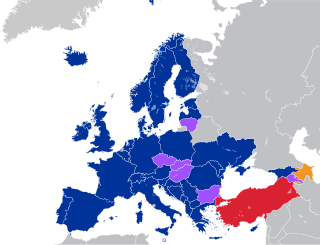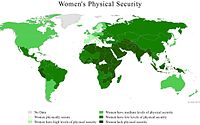Sexual assault is an act of sexual abuse in which one intentionally sexually touches another person without that person's consent, or coerces or physically forces a person to engage in a sexual act against their will. It is a form of sexual violence that includes child sexual abuse, groping, rape, drug facilitated sexual assault, and the torture of the person in a sexual manner.
Marital rape or spousal rape is the act of sexual intercourse with one's spouse without the spouse's consent. The lack of consent is the essential element and doesn't always involve physical violence. Marital rape is considered a form of domestic violence and sexual abuse. Although, historically, sexual intercourse within marriage was regarded as a right of spouses, engaging in the act without the spouse's consent is now widely classified as rape by many societies around the world, and increasingly criminalized. However it is repudiated by some more conservative cultures.
The legal age of consent for sexual activity varies by jurisdiction across Asia. The specific activity engaged in or the gender of participants can also be relevant factors. Below is a discussion of the various laws dealing with this subject. The highlighted age refers to an age at or above which an individual can engage in unfettered sexual relations with another who is also at or above that age. Other variables, such as homosexual relations or close in age exceptions, may exist, and are noted when relevant.

The age of consent for sex outside of marriage varies by jurisdiction across Europe. The age of consent – hereby meaning the age from which one is deemed able to consent to having sex with anyone else of consenting age or above – varies between 14 and 18. The majority of countries set their ages in the range of 14 to 16; only four countries, Cyprus (17), Ireland (17), Turkey (18), and the Vatican City (18), set an age of consent higher than 16.

The age of consent in Africa for sexual activity varies by jurisdiction across the continent, codified in laws which may also stipulate the specific activities that are permitted or the gender of participants for different ages. Other variables may exist, such as close-in-age exemptions.
Rape is a type of sexual assault initiated by one or more persons against another person without that person's consent. The act may be carried out by physical force, under threat or manipulation, by impersonation, or with a person who is incapable of giving valid consent.
Rape in the Philippines is considered a criminal offense. In Philippine jurisprudence, it is a heinous crime punishable by reclusión perpetua when committed against women. Rape of males is also legally recognized as rape by sexual assault, which is penalized by imprisonment of six to twelve years.

As sexual violence affects all parts of society, the responses that arise to combat it are comprehensive, taking place on the individual, administrative, legal, and social levels.

Human trafficking is the trade of humans for the purpose of forced labour, sexual slavery, or commercial sexual exploitation.

Prostitution laws varies widely from country to country, and between jurisdictions within a country. At one extreme, prostitution or sex work is legal in some places and regarded as a profession, while at the other extreme, it is considered a severe crime punishable by death in some other places. A variety of different legal models exist around the world, including total bans, bans that only target the customer, and laws permitting prostitution but prohibiting organized groups, an example being brothels.

The Council of Europe Convention on Preventing and Combating Violence Against Women and Domestic Violence, better known as the Istanbul Convention, is a human rights treaty of the Council of Europe opposing violence against women and domestic violence which was opened for signature on 11 May 2011, in Istanbul, Turkey. The convention aims at prevention of violence, victim protection and to end the impunity of perpetrators.
Rape is the fourth most common crime against women in India. According to the 2021 annual report of the National Crime Records Bureau (NCRB), 31,677 rape cases were registered across the country, or an average of 86 cases daily, a rise from 2020 with 28,046 cases, while in 2019, 32,033 cases were registered. Of the total 31,677 rape cases, 28,147 of the rapes were committed by persons known to the victim. The share of victims who were minors or below 18 – the legal age of consent – stood at 10%.
Marital rape is illegal in all 50 US states, though the details of the offence vary by state.

Women in Brunei are women living in Brunei Darussalam. The U.S. Department of State has stated that discrimination against women is a problem in Brunei.

Crime is present in various forms in the Philippines, and remains a serious issue throughout the country. Illegal drug trade, human trafficking, arms trafficking, murder, corruption and domestic violence remain significant concerns.
The Federated States of Micronesia is a United States Associated State consisting of 4 states across the Western Pacific Ocean. The estimated population in 2015 was 105,216. Formerly the FSM was a part of the Trust Territory of the Pacific Islands (TTPI) but in 1979 formed its own constitutional government. FSM has a written constitution which took effect in 1979 and has been amended only once in 1990. By virtue of membership in the United Nations, the FSM abides by the UN Declaration of Human Rights (UDHR). Key human rights concerns in FSM include judicial delays, government corruption, discrimination against women, domestic violence and child neglect.
Violence against women includes physical, psychological, emotional, and sexual abuse of women, predominantly by men. The most common form of violence is domestic violence. Malaysia rated 0.681 under the Global Gender Gap Report 2022 and ranked 103rd out of 146 countries.
Rape laws vary across the United States jurisdictions. However, rape is federally defined for statistical purposes as:
Penetration, no matter how slight, of the vagina or anus with any body part or object, or oral penetration by a sex organ of another person, without the consent of the victim.
Human rights in Norway protect the fundamental rights of all persons within the Kingdom of Norway. These rights are safeguarded by Chapter E of the Constitution of Norway or Kongeriket Norges Grunnlov, as well as the ratification of various international treaties facilitated by the United Nations. The country maintains a dedicated commitment to human rights and was the second country to ratify the European Convention on Human Rights.
Sexual consent plays an important role in laws regarding rape, sexual assault and other forms of sexual violence. In a court of law, whether or not the alleged victim had freely given consent, and whether or not they were deemed to be capable of giving consent, can determine whether the alleged perpetrator is guilty of rape, sexual assault or some other form of sexual misconduct.








